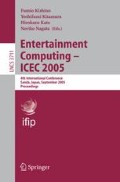Abstract
The paper will explore how the landscape types and the quest types are used in various games, how they structure the gameplay, how they act as bones for the game-content (graphics, dialogue, sound) and how they sometimes form the base on which a story is imposed and related to the player. The question then becomes, how does the quest structure influence the story structure? How do the limitations of the quest combinations limit the kinds of story that are possible? How rich can the imposed story be, without breaking the gameplay? Are landscape and quest-structure the dominant factors in quest game design, to which the story-ambitions must defer? The main thesis of the paper is that if we understand the powerful but simple structure – the grammar – of quests (how they work, how they are used) we can understand both the limits and the potential of these kinds of games.
Access this chapter
Tax calculation will be finalised at checkout
Purchases are for personal use only
Preview
Unable to display preview. Download preview PDF.
References
Aarseth, E.: Quest Games as Post-Narrative Discourse. In: Ryan, M.-L. (ed.) Narrative Across Media, pp. 361–376. University of Nebraska Press (2004)
Brand, J., Scott, K.: The Narrative and Ludic Nexus in Computer Games: Diverse Worlds II. Paper presented at the DIGRA conference in Vancouver (2005)
Buckles, M.A.: Interactive Fiction: The Storygame Adventure. Ph.D.-dissertation, UCSD (1985)
Frasca, G.: Ludologists love stories, too: notes from a debate that never took place. In: Proceedings Level Up 2003 Conference (2003)
Jenkins, H.: Game Design as Narrative Architecture. In: Harrigan, P., Wardrip-Fruin, N. (eds.) First Person, pp. 118–130. MIT Press, Cambridge (2004)
Niesz, A.J., Norman, N.H.: Interactive Fiction. Critical Inquiry 11(1), 110–129 (1984)
Tosca, S.: The Quest Problem in Computer Games. Presented at the Technologies for Interactive Digital Storytelling and Entertainment (TIDSE) conference, in Darmstadt (2003), http://www.itu.dk/people/tosca/quest.htm
Tronstad, R.: Semiotic and Non-Semiotic MUD Performance. Paper presented at the COSIGN conference, Amsterdam, (2001), http://www.kinonet.com/conferences/cosign2001/pdfs/Tronstad.pdf
Wibroe, M., Nygaard, K.K., Bøgh Andersen, P.: Games and Stories. In: Qvotrup, L. (ed.) Virtual Interaction, pp. 166–181. Springer, Heidelberg (2001)
Author information
Authors and Affiliations
Editor information
Editors and Affiliations
Rights and permissions
Copyright information
© 2005 IFIP International Federation for Information Processing
About this paper
Cite this paper
Aarseth, E. (2005). From Hunt the Wumpus to EverQuest: Introduction to Quest Theory. In: Kishino, F., Kitamura, Y., Kato, H., Nagata, N. (eds) Entertainment Computing - ICEC 2005. ICEC 2005. Lecture Notes in Computer Science, vol 3711. Springer, Berlin, Heidelberg. https://doi.org/10.1007/11558651_48
Download citation
DOI: https://doi.org/10.1007/11558651_48
Publisher Name: Springer, Berlin, Heidelberg
Print ISBN: 978-3-540-29034-6
Online ISBN: 978-3-540-32054-8
eBook Packages: Computer ScienceComputer Science (R0)

